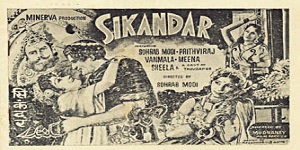
One of the prominent historical movies which was well renowned for raising nationalist sentiments was Sikandar. Released in 1941, the movie was directed by Sohrab Modi, a prominent actor, and filmmaker born in present-day Mumbai in Maharashtra. The movie traces Alexander the Great called Sikander’s (Prithviraj Kapoor) thwarted attempt at entering the Indian subcontinent. Having taken over Persia, and Kabul valley, he prepared to take over Jhelum but it was met with stiff resistance from Punjab king Porus (Sohrab Modi). Against the advice of Aristotle, Sikander falls in love with a Persian woman Rukshana who, fearing the life of Sikander, pleads to King Porus not to hurt Sikandar. In the battle that follows, King Porus loses to Sinkandea. After imprisoning him, Sinkander asks Porus how he would like to be treated to which Porus replies “the same way a defeated king is treated by the winner” (means killed). Impressed by the answer, Sikander sets Porus free. This reveals the courage and valiance that India was known for.
Sohrab Modi directed Sikander with the theme of nationalism and freedom struggle. Several historical movies of the period, including Sikander, evoked the glory of India and how the Indian nation and its unity were rooted in the midst of time. The release of Sikander coincided with World War II and the Quit India Movement and it heightened patriotic feelings and nationalist sentiments. The movie was banned from some of the theatres serving the British Army cantonments. Despite this, due to its appeal to nationalism, it remained popular for years.
Source: Indian Culture Portal